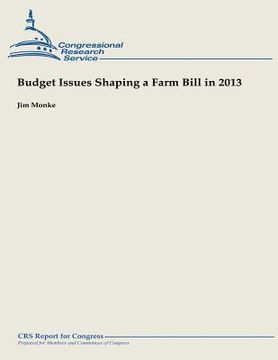Share
Budget Issues Shaping a Farm Bill in 2013 (in English)
Jim Monke
(Author)
·
Createspace Independent Publishing Platform
· Paperback
Budget Issues Shaping a Farm Bill in 2013 (in English) - Monke, Jim
$ 10.87
$ 13.59
You save: $ 2.72
Choose the list to add your product or create one New List
✓ Product added successfully to the Wishlist.
Go to My WishlistsIt will be shipped from our warehouse between
Friday, June 28 and
Monday, July 01.
You will receive it anywhere in United States between 1 and 3 business days after shipment.
Synopsis "Budget Issues Shaping a Farm Bill in 2013 (in English)"
The desire by many to redesign farm policy and reallocate the remaining farm bill baseline-in a sequestration and deficit reduction environment-is driving much of the farm bill debate this year. Several high-profile congressional and Administration proposals for deficit reduction have specifically targeted agricultural programs with mandatory funding. The political dynamics of sequestration and broader deficit reduction goals leave open difficult questions about how much and when the farm bill baseline may be reduced. In this context, Congress faces difficult choices about how much total support to provide for agriculture, and how to allocate that support among competing constituencies. Funding to write the next farm bill is based on Congressional Budget Office (CBO) baseline projections of the cost of farm bill programs, and on varying budgetary assumptions about whether programs will continue. The CBO baseline is an estimation (projection) at a particular point in time of what federal spending on mandatory programs likely would be under current law. In May 2013, CBO projected that the current farm bill programs, if they were to continue beyond the 2008 farm bill, would cost $973 billion over the next 10 years (FY2014-FY2023). This baseline estimate already has been reduced by $6.4 billion over the same period because of the sequestration ordered on March 1, 2013. When new bills are proposed that affect mandatory spending, their impact (or "score") is measured as a difference from the baseline. This baseline and scoring process sets the mandatory budget for considering a new farm bill. The Senate-reported farm bill, S. 954, would reduce spending by $17.9 billion (-1.8%); and the House-reported bill, H.R. 1947, would reduce it by $33.4 billion (-3.4%). CBO noted that if sequestration was repealed and the baseline was increased by the $6.4 billion adjustment that has been taken, then the farm bill proposals would reduce spending by $24 billion (Senate) and $40 billion (House) over the next 10 years. Moreover, some popular 2008 farm bill programs do not have a baseline to continue, and will require additional budgetary offsets if they are included in a new farm bill.
- 0% (0)
- 0% (0)
- 0% (0)
- 0% (0)
- 0% (0)
All books in our catalog are Original.
The book is written in English.
The binding of this edition is Paperback.
✓ Producto agregado correctamente al carro, Ir a Pagar.

